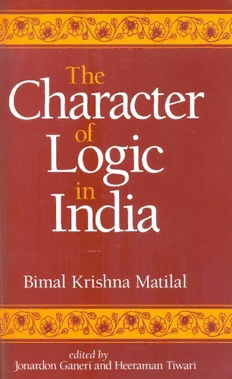
The Character of Logic in India PDF
Preview The Character of Logic in India
THE CHARACTER OF LOGIC IN INDIA BIMAL KRISHNA MATILAL (COURTESY OF MRS. KARABI MATILAL) THE CHARACTER OF LOGIC IN INDIA BIMAL KRISHNA MATILAL Edited by Jonardon Ganeri and Heeraman Tiwari STATE UNIVERSITY OF NEW YORK PRESS SUNY SERIES IN INDIAN THOUGHT: TEXTS AND STUDIES WILHELM HALBFASS, EDITOR Published by State University of New York Press, Albany ©1998 State University of New York All rights reserved Printed in the United States of America No part of this book may be used or reproduced in any manner whatsoever without written permission. No part of this book may be stored in a retrieval system or transmitted in any form or by any means including electronic, electrostatic, magnetic tape, mechanical, photocopying, recording, or otherwise without the prior permission in writing of the publisher. For information, address State University of New York Press, State University Plaza, Albany, N.Y, 12246 Production by E. Moore Marketing by Anne M. Valentine Library of Congress Cataloging-in-Publication Data Matilal, Bimal Krishna. The character of logic in India/Bimal Krishna Matilal : edited by Jonardon Ganeri and Heeraman Tiwari. p. cm. — (SUNY series in Indian thought) Includes bibliographical references and index. ISBN 0-7914-3739-6 (he : acid free). — ISBN 0-7914-3740-X (pb acid free) 1. Logic—India—History. I. Ganeri, Jonardon. II. Tiwari Heeraman. IE. Title. IV. Series. 160'.954—dc21 97-19873 CIP 10 9 8 7 6 5 4 3 21 CONTENTS Editors' Foreword vii 1. Introducing Indian Logic 1 2. Debates and Directives 31 3. Tricks and Checks in Debate 60 4. Difmäga: A New Era in Logical Thinking 88 5. Dharmakirti and the Problem of Induction in India 108 6. The Jaina Contribution to Logic 127 7. Navya-Nyäya: Technical Developments in the New School since 1300 AD 140 Philosophers Discussed 169 Bibliography 171 Index 177 EDITORS' FOREWORD Matilal planned this book around 1988, in conjunction with the Institut International de Philosophie in Paris. He wrote most of it during the years 1989 to 1991. The structure of the book suggests comparison with Kneale and Kneale's The Development of Logic, that is, to be a book in which the origins of logical theory in India are traced chronologically, while paying at the same time careful attention to their philosophical significance. He would perhaps have agreed with Kneale and Kneale, who described the primary purpose of their work as having been "to record the first appearances of those ideas which seem to us most important in the logic of our own day" (1964: v). Writing this book provided Matilal with an opportunity to present what he took to be the most distinctive features of Indian logic, and to elaborate his views on the nature of philosophical activity in classical India. There is, however, a single central theme to this book, namely an inquiry into the origins, development, and nature of the Indian concept of an "inference- warranting relation" (vyäpti), often called the relation of "concomitance" or "pervasion," between the reason or evidence and the inferred conclusion. Matilal traces the origins of this concept to the early debating manuals, where the first attempts to demarcate the good or rational patterns of argument from the bad or irrational ones are to be found. He traces its development to two Buddhist logicians, Dinnäga and Dharmakirti, who were largely responsible for the construction of a clearly-articulated theory of the relation, as well as to Gangesa and his Navya-nyäya school, where the proper definition and analysis of the relation came to be an all-important concern. The following brief outline charts the course taken in the book. In the first chapter, having given an introductory overview of the topics to be dis- cussed in later chapters, Matilal reconstructs the Indian theory of inference in
